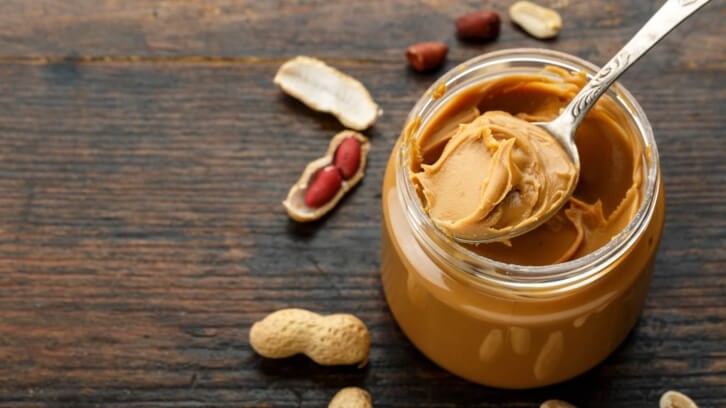Prebiotic peanut polyphenols may boost mood and memory: RCT

Six months of daily consumption of skin roasted peanuts or peanut butter led to better memory scores that were linked to higher urinary concentrations of enterolignans, the major microbial end metabolites derived from lignans.
The data, published in the Journal of Functional Foods, also indicated that peanut consumption could reduce stress response, including anxiety and depression, in healthy young adults.
“The present study provides valuable insights to understand the role of microbial phenolic metabolites in the gut-brain axis,” wrote the researchers.
“The results found are encouraging, but further research is needed to establish evidence-based recommendations for the use peanut products in dietary strategies aimed to improve memory and mental health.”
ARISTOTLE
The improvements in memory and stress response were first reported in 2021 in Clinical Nutrition. That paper linked the effects to the intake of peanut polyphenols to increased levels of fecal short chain fatty acids (SCFAs), indicative of an effect on the gut microbiota.
This new paper goes further by reporting that peanut consumption was associated with higher levels of microbial phenolic metabolites (MPMs), which are compounds that can cross the blood-brain barrier and reach brain cells to protect them.
"Peanuts and peanut butter may have a beneficial effect on the gut microbiota because they are rich in prebiotic fiber and polyphenols," said Dr Isabella Parilli Moser, first author of the study. "Due to their very poor absorption, fiber and most polyphenols directly reach the colon, where they are metabolized by the gut microbiota, giving rise to new compounds (MPMs), which can have beneficial effects on the brain."
Prebiotics are defined as: A substrate that is selectively utilized by host microorganisms conferring a health benefit (Gibson et al. (ISAPP), Nat Rev Gastroenterol Hepatol, 2017).
"Prebiotic substances present in peanuts and peanut butter, such as polyphenols, may positively affect cognition and mood by promoting production of microbial phenolic metabolites,” added Dr Sara Hurtado-Barroso, co-author of the study.
Study details
The ARISTOTLE trial included 44 women and 19 men aged between 18 and 33 (mostly students at the University of Barcelona), who were randomly assigned to one of three groups: 25 grams per day (one handful) of roasted peanuts with skins, 32 grams (two tablespoons) per day of peanut butter, or 32 grams per day of a control butter. The men and women were asked to exclude wine, grapes, dark chocolate with more than 70% cacao and berries from their diets due to their high levels of resveratrol. In addition, other nuts were excluded from the diet due to similar nutritional composition.
After six months of intervention, the results indicated that the peanut groups had higher urinary excretion of MPM enterolignans (enterodiol and enterolactone) and hydroxybenzoic acids. The urinary MPM increase was associated with an improvement in memory and stress response, said the researchers.
“To our knowledge, the present study is the first to analyze urinary MPMs after peanut consumption and associate them with cognitive and mood outcomes,” wrote the researchers. “Dietary polyphenols can influence the composition of the gut microbial community and, conversely, phenolic metabolism and bioavailability depend on the microbiota and associated enzymatic transformations.
“The extensive metabolism that polyphenols undergo in the gut microbiota suggests that the resulting metabolites such as the MPMs may play a significant role in the health effects attributed to dietary polyphenols. Nevertheless, further research is needed to fully understand the molecular mechanisms that link these phenolic metabolites to cognitive health.”
“Exciting”
The study’s findings were welcomed by Dr Samara Sterling, a nutrition scientist and research director for The Peanut Institute. "More and more research is looking at our gut microbiome and how it plays an integral role in affecting our immune system, brain health and other body functions," she said.
"These findings are exciting because the students consumed a relatively small amount of peanuts each day, but the impact on their memory and mood was statistically significant."
Source: Journal of Functional Foods
Volume 108, 2023, 105746, doi: 10.1016/j.jff.2023.105746
“Consumption of peanut products enhances the production of microbial phenolic metabolites related with memory and stress response: Results from the ARISTOTLE trial”
Authors: I. Parilli-Moser at al.












